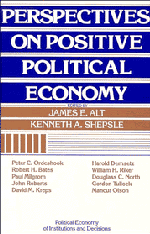Book contents
- Frontmatter
- Contents
- List of contributors
- Series editors' preface
- Acknowledgments
- Editors' introduction
- PART I THE NEW POLITICAL ECONOMY
- 1 The emerging discipline of political economy
- 2 Macropolitical economy in the field of development
- PART II ORGANIZATIONS, TRANSACTIONS, AND OPPORTUNITIES
- PART III REFLECTIONS ON THEORETICAL FOUNDATIONS
- Notes
- References
- Index
1 - The emerging discipline of political economy
Published online by Cambridge University Press: 05 July 2011
- Frontmatter
- Contents
- List of contributors
- Series editors' preface
- Acknowledgments
- Editors' introduction
- PART I THE NEW POLITICAL ECONOMY
- 1 The emerging discipline of political economy
- 2 Macropolitical economy in the field of development
- PART II ORGANIZATIONS, TRANSACTIONS, AND OPPORTUNITIES
- PART III REFLECTIONS ON THEORETICAL FOUNDATIONS
- Notes
- References
- Index
Summary
That political and economic processes cannot be separated seems self-evident. Markets are regulated by the coercive institutions of the state, and the state dictates the supply of that most efficient accounting of exchange – money. Simultaneously, regardless of a state's form, as long as two people perceive mutual advantages from exchange, markets, however primitive, will persist. Thus, the hard-learned lesson of political conservatives is that the state establishes the context in which markets operate and stands ready at any time to upset any particular market outcome. People are not merely consumers and producers, they are also citizens in a variety of polities that can not only regulate markets but can also expropriate directly the resources markets allocate. Correspondingly, it is impossible to predict market outcomes without also predicting the political responses that alternative outcomes engender. On the other hand, the hard-learned lesson of the left, and of cruder forms of Marxism in particular, is that whatever institutional structure the state takes, the laws governing market forces cannot be abrogated – the forces of supply and demand operate regardless of culture, ethnic identity, socialization pattern, ideology, and political system.
From this view, it is surprising to find economics and politics divided into distinct disciplines, with their joint study impeded by bureaucratic divisions at universities, by the specialization of scholarly journals, and by the prevalent use of modes of inquiry in political science that are seemingly at odds with those used in economics.
- Type
- Chapter
- Information
- Perspectives on Positive Political Economy , pp. 9 - 30Publisher: Cambridge University PressPrint publication year: 1990
- 19
- Cited by



